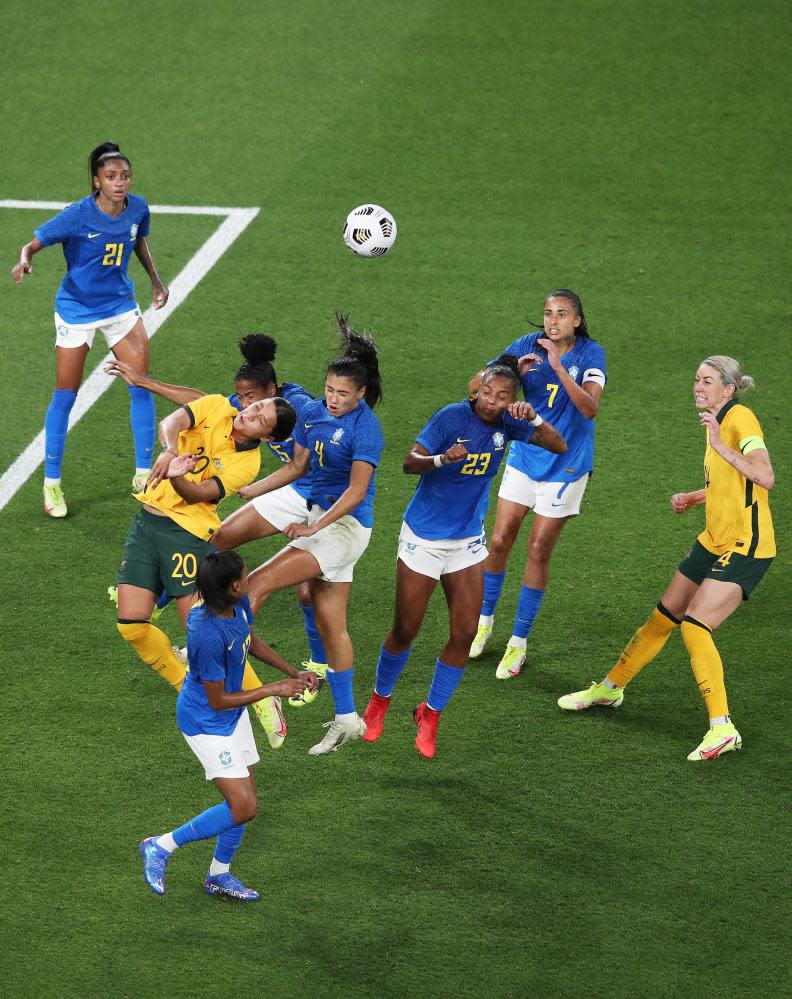Matildas sweep aside external pressure and Brazil in statement performance

On Friday, during his pre-match press conference, Tony Gustavsson demonstrated what he called the “pressure metaphor”. The former maths teacher, while on a Zoom call with journalists, retrieved a whiteboard and marker, moved them into his frame and, in animated fashion, drew a circle inside another circle. Outside the larger, he said, was external pressure. Inside the smaller was internal pressure.
Theoretically, the donut-shaped sliver of “thin air” in between represented the “performance zone”. This space is the Rolls-Royce of focus and expectation management. Nothing bad is getting in there for the 90 minutes it takes to, say, beat Brazil in a friendly match. “If you want to be part of a successful team that wins things,” Gustavsson said, “you need to able to perform in thin air.”
Related: Australia 3-1 Brazil: women’s football friendly – as it happened
Saturday night’s emphatic 3-1 win was a William Shatner-esque lesson on how to perform in space. And it was all the more pleasing because both varieties of pressure may well have invaded that performance zone given Australia’s national team are currently under a pile of the stuff.
After a Covid-enforced absence of almost two years, many overseas-based players have returned home for the first time since the pandemic began but cannot properly see family and friends from inside their biosecure bubble. Said bubble has softened the blow of the media firestorm around Lisa De Vanna’s claims of a toxic culture at all levels of the women’s game. Sport Integrity Australia will soon open its investigation but for the now the current playing group – none of whom are the subjects of any specific public allegations – have become the unwarranted subjects of speculative criticism and online trolling.

And yet, at Parramatta’s Commbank Stadium, the Matildas played with the wild abandon of a side in control of extraneous noise and thus their own destiny.
“I’m actually very impressed in terms of that,” Gustavsson said afterwards. “The professionalism of this team was really shown tonight. But I also want to add one thing to that: I think we got tremendous help from the support in the stands to really carry them forward.
Those first 20 minutes, the energy, the enthusiasm, the tempo - we should have been 2-0 up. That shows a little bit what we want to be about in terms of the aggressive pressing, the high tempo, get a lot of numbers in attack and play kind of free from fear, so to speak. To be able to do that in these circumstances was impressive tonight.”
It began with a franticness befitting their manager’s mantra. Riding on the momentum of Steph Catley and Ellie Carpenter out wide, and the industry of Kyra Cooney-Cross and Mary Fowler, they flooded Brazil’s penalty area, with Sam Kerr occasionally dropping back to assist in the build-up.
The speed of movement almost elicited an early goal but for Letícia’s brave intervention while one on one with an approaching Tameka Yallop. Yallop, in attempting to hurdle the goalkeeper, inadvertently thrust her knee into her face, Leticia unmoving on the ground for some 30 seconds before she picked herself up just in time to watch Kyah Simon’s shot from distance take a deflection and sail narrowly wide.
Brazil, though, were robust in defence and sound in structure. As the initial intensity waned they found opportunities via the odd Matildas error. Alanna Kennedy copped a yellow card and was lucky it was not more after brazenly fouling Giovanna Crivelari, before the latter collided with Catley.
Australia rode their luck until a Catley free-kick found Kerr’s head at the far post and the skipper nodded to Polkinghorne, who was ready across goal in the six-yard box for the tap-in.
The hosts doubled the lead after the break through Fowler, whose rise on the international stage matched her deft finish from an Emily van Egmond cross. Where Brazil were at fault for failing to defend the preceding throw-in and track Fowler’s run, Kennedy was responsible for Brazil’s goal just two minutes later.
The defender was turned with too much ease by Adriana, who offered Lydia Williams little chance to cover her goal. The game was on, and Marta’s entrance made for an entertaining final 20 minutes, during which van Egmond side-footed the match sealer with help from Kerr and then Catley.

Australia have not lost to Brazil since July 2016 and this performance in front of the 15,270 in attendance ensured it remains so – even if the outcome of this particular fixture held less certainty than in years past. The South Americans, despite being in transition, now sit higher in the Fifa rankings than their counterparts. Coached by the decorated Pia Sundhage – another Swede under whom Gustavsson worked at Team USA – they went undefeated in Tokyo until Canada knocked them out in the quarter-finals en route to the gold medal. The Matildas made it to the bronze medal match but won only once in 90 minutes on the way, against New Zealand.
At the turn of the year Gustavsson inherited a team ranked seventh. As of August they are 11th. Under the Swede they have three wins, two draws and eight losses – the latest was last month’s friendly loss to Ireland – and have conceded 30 goals. Gustavsson – for now, at least – is prioritising process over pragmatism. The modus operandi is “preparation” rather than “performance”. He would have taken a loss if it meant development ahead of the 2023 home World Cup and, more immediately, the Asian Cup this coming January. Only two international windows remain between now and then, but the air was thin enough on Saturday to suggest Tuesday’s second friendly may yield more reward.

 Yahoo Finance
Yahoo Finance 